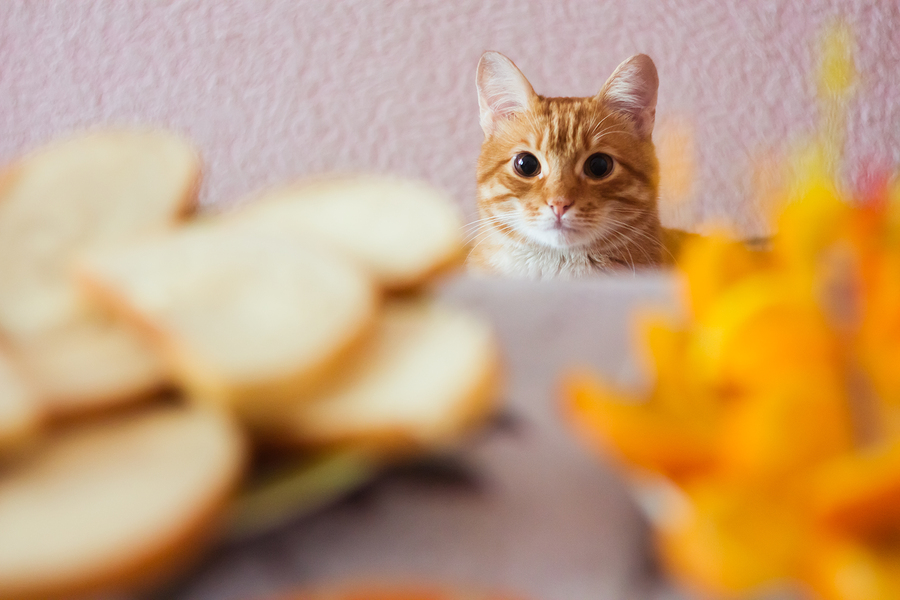This post may contain affiliate links. We are compensated for referring customers to our affiliate partners.
As we arrive at the holiday season, it is safe to say that there may be just a touch of overindulgence on food over the course of the next few weeks. I know I certainly will be having an extra slice of pie at some point, if this past Thanksgiving was any indication. Chances are if your beloved cat ate anything during your Thanksgiving feast that they weren’t supposed to, you would have figured it out by this point. However, as the holiday season tends to be the busiest season at emergency veterinary hospitals, it is worth refreshing with our cat nutrition tips and reminding ourselves about some of the foods that are safe – and unsafe – for cats to consume!
What is the Best Food for Cats?
When considering what foods your cat can consume, remember that cats are carnivores. This means that they are meat eaters, but are also very inflexible when it comes to nutrition. Meat provides the protein and fats necessary for cats. Carbohydrates are not processed well, and can lead to obesity and diabetes.
How Does this Translate To A Holiday Meal?
Animal protein is a cat’s most prized food. Knowing this, turkey meat is definitely safe to feed your cat this holiday season. If possible, dark meat and skin provide the most nutritional fatty proteins. Your cat may also indulge on turkey organs such as the kidney, liver, or heart. As long as the meat is cooked and properly stored, it is safe to save the meat for a future meal.
Even though your feline is a carnivore and is partial to meats, these foods should be introduced gradually. Don’t let your cat have a free-for-all with the rest of the uncarved turkey. Although these cat nutrition tips stand to serve as guidelines, foods may impact different cats in different ways. Start with a little bit at a time, and see how your cat reacts to the food. Make sure there are no gastrointestinal issues, and that the food is cooperating with your cat a while after it has been consumed.
There are some foods that should definitely not be given to your cat as treat this holiday season. Cats should not be fed any bones, as they do not digest well and can prompt internal injuries. Artificial sweeteners, seasonings, and butter should all be avoided as well, in addition to chocolate. Cats should not be fed any grapes, raisins, or popcorn. You should also not give your cat dairy products such as milk or cream, as their digestive systems will become agitated. Fun fact: most cats are actually lactose-intolerant!
The holiday season also gives an excuse for humans to indulge in alcohol. However, your cat should not be indulging at all. It is incredibly dangerous. Alcohol impacts a cat the same way it does humans, except for the fact that it takes far less alcohol to have the same effect. Two teaspoons of whiskey can cause a coma in a cat. So that playful sip your cousin wants to sneak your cat late at night? Yeah….don’t let him do that.
Are There Other Foods That Are Dangerous?
There are other foods that could prove to be potentially harmful to your cat.
- Tuna – While ok in moderation, too much can lead to malnutrition and potential mercury poisoning
- Onions, Garlic, and Chives – These can break down a cat’s red blood cells, causing anemia. While a SMALL amount occasionally won’t hurt, a large quantity or a consistent diet will lead to serious health problems.
- Yeast Dough – Yeast needs to be cooked before it is consumed by your cat. If it is not, then it will rise the same way it is when it is uncooked – except in the stomach of cat. Naturally, this will result in severe pain due to abdominal stretching. The fermentation process that would occur could also lead to alcohol poisoning.
- Dog Food – Simply put, dog food is not a substitute for cat food. The dietary needs of cats and dogs are drastically different, and a cat fed a dog food-based diet will become severely malnourished. Dog food is heavily carbohydrated. As mentioned before, a carbohydrate-heavy diet will cause serious health problems in cats.
- Your Medicine – This may seem obvious, but ingesting human prescriptions and medications is one of the most common causes of poisoning in cats. All medications should be stored in a safe place where your cat would not be able to get to them. Never give your cat medication unless prescribed by a veterinarian. Common ingredients such as ibuprofen and acetaminophen can prove deadly to cats.
Raw Food Diet for Cats
Keeping these in mind, I am confident that you and your cat can share a happy and healthy holiday season together. Remember, the rule of moderation still applies. Just as you wouldn’t want to overindulge in something that isn’t good for you, your cat shouldn’t either. A treat is perfectly ok every now and then, but treats should not become the status quo during the holidays. Be mindful of the fact that once a cat puts on weight, it becomes incredibly difficult for the cat to lose the weight. A few too many treats during the holidays could lead to health problems down the road, so be sure to keep them to a minimum. Keep these cat nutrition tips in mind, and bon appétit!



